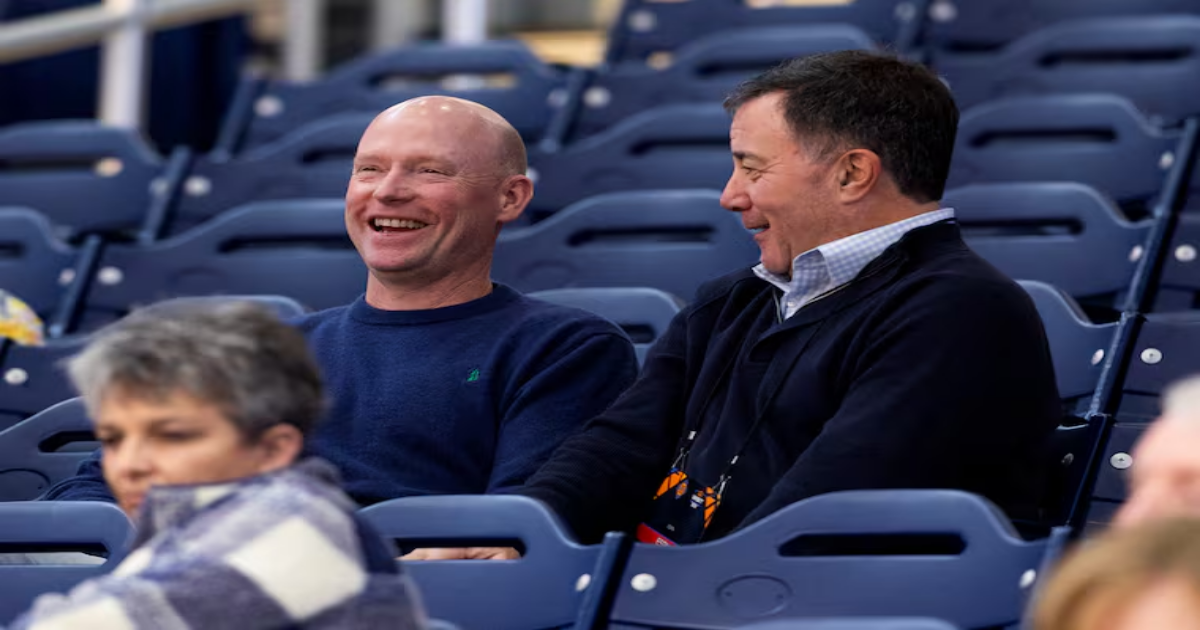Every step of Kevin Willard’s journey to Villanova from Maryland should be instructive and sobering. It should strip away any remaining sentimentality about the world of college basketball and how Villanova’s leaders view the Wildcats’ place in it. It should leave no doubt that those leaders wanted to, and perhaps recognized they had to, take the men’s basketball program in a new direction. And it should put the Big 5 on notice that the member in the biggest conference and with the most resources could seek to separate itself even further from its local rivals. Here’s why:
1. The words won’t matter. The wins will.
Yes, Willard spent the last three weeks talking in circles whenever he was asked about his future. He pleaded for Maryland to invest in and improve its program, then told reporters, “I don’t know what I’m doing,” then said he hadn’t talked to his wife or his agent about the Villanova job, then may or may not have taken credit for combining chocolate with peanut butter and inventing the internet — all while the scuttlebutt and whisper-down-the-lane gossip in college hoops circles was unanimous that he would become the Wildcats’ coach soon enough.
» READ MORE: An obituary for Cinderella, the darling of March Madness, now gone for good
At the same time, Villanova athletic director Eric Roedl, president Rev. Peter Donohue, and everyone else involved in Kyle Neptune’s replacement search carried themselves as if they were paying no attention to all of Willard’s public verbal tap-dancing. They were quiet and clear-eyed about their mission. Granted, they didn’t have much choice.
For Villanova to return to relevance within the Big East, it would have to find a coach who at least believed he could win there and at best already had. Willard fit both bills, guiding Seton Hall to the 2016 Big East tournament championship and to the NCAA Tournament five times over his final seven years there (it would have been six times if not for COVID), and Villanova’s decision-makers and alumni were happy to put up with his double-talking about his departure from College Park. They won’t care a whit about what he says here, either, as long as the Wildcats compete for conference titles and get back to the Tournament.
No one who roots for Villanova will, either. There’s only one form of loyalty to be found in college basketball anymore, and it runs in just one direction. The coaches and athletes have abandoned any sense of it; the former are still bouncing from job to job, and the latter are streaming into the transfer portal. Boosters and fan bases define themselves by their devotion to their alma maters and favorite programs, of course, and Terps fans are outraged that Willard came off as so duplicitous in his negotiations with the university. Had the situation been reversed, though, had Maryland been chasing a coach instead of trying to keep one, it’s a safe bet those same fans wouldn’t have been complaining about tampering or criticizing the coach’s evasiveness.
2. Getting real about the Big East
Willard is the kind of coach Villanova chose not to hire after Jay Wright’s retirement in 2022. The Wildcats will be his third head-coaching job in a five-year span, and while he surely has familiarity with and respect for Wright and Villanova’s program, he’s not a product of the university’s traditions and culture in any regard. He is a hired gun, or at least he has been one. He might settle in and stay for the long haul, but no one should be under any illusions about why and how Villanova hired him.
That’s the right way for any school in the Big East — the conference whose basketball programs, once some of the revenue-sharing dust starts to settle, might have more spending power than many Power Four schools — to confront its immediate future. Connecticut has Dan Hurley, a two-time national champ with as high a profile as any coach in the sport, and its status as the commanding sports institution in its state (depending on the condition of UConn’s women’s basketball program in a given year). St. John’s has Rick Pitino. It has Madison Square Garden and the New York market. Most importantly, it has Mike Repole, the billionaire sports-drink mogul and a member of the St. John’s Class of 1991, pouring money into its program.
» READ MORE: Kyle Neptune was overwhelmed as Villanova’s head coach. The Wildcats need a dynamic leader.
Villanova was never going to catch up to and keep up with those teams by clinging to any vestige of a mom-and-pop approach to big-time college sports. But we’re Villanova. We have to hire someone who is part of our family. Nope. Not anymore.
3. Upheaval in the Big 5?
Wright’s tenure was a blessing and a curse for the City Series. He paid genuine homage to its past and present and worked to keep Villanova’s connection to it strong … while also coaching the Wildcats through an unmatched stretch of dominance. Neptune didn’t have the cachet to change that relationship even if he wanted to, and since its inception in 2023, the Big 5 Classic has restored some juice to the games that ‘Nova, Temple, St. Joseph’s, La Salle, Penn, and Drexel play against each other.
Would Willard be open to severing Villanova’s ties to the Big 5? He didn’t mind having Seton Hall’s 100-year series with St. Peter’s end on his watch, and he was not especially enthusiastic about the Pirates’ annual matchup against Rutgers for New Jersey supremacy — a game in which Seton Hall, traditionally the better program, had little to gain and a lot to lose. The New York Post once referred to him as the “rivalry grinch.” The Classic’s contract has two years left. Once the schools fulfill those obligations, it wouldn’t be all that shocking if Willard, maybe under the guise of seeking some early-season scheduling freedom, started inching Villanova toward an exit.



